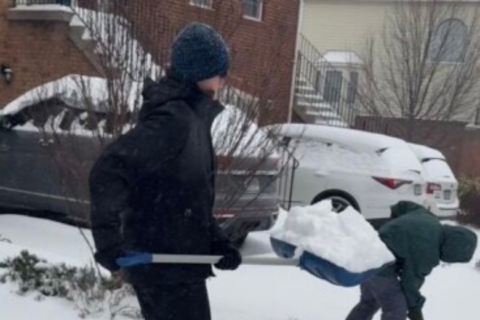For years, Loudoun County has been Virginia’s fastest-growing county, adding homes, retail, restaurants and the world’s largest concentration of data centers in what was once a largely rural county.
Development doesn’t happen all at once, which can lead to congestion on a road network that continues to develop to get people from home, to work, school and activity centers.
“Sitting in traffic is a quality-of-life issue,” says Phyllis Randall, chair of the Loudoun County Board of Supervisors.
With the substantial completion of construction of the Metrorail Silver Line extension project completed, Loudoun County is attempting to flesh-out the roads that would get people to mass transit and provide other options.
Thursday marks the groundbreaking for the widening of a stretch of Belmont Ridge Road — just one example of a roadway that has struggled to carry drivers from Point A to Point B, during the ongoing transformation of Loudoun County.
Belmont Ridge Road — Virginia Route 659 — runs through neighborhoods, which began with Ashburn, and now include Brambleton, Broadlands and Moorefield Station. With exits from major commuter routes, including the Dulles Greenway, and Virginia State Route 7, it is a focus for future development.
Yet, portions of Belmont Ridge Road remain a narrow, two-lane road, not looking much different from when they supported a largely agricultural community.
“Today, we’re starting to widen Belmont Ridge Road from Truro Parish Drive to Croson Lane. We’re going to move it from a two-lane road, to a four-lane road with a median. It will both help congestion and some of the school traffic that is around the Belmont area,” said Randall.
The 3 1/2-mile widening project will include multimodal improvements along Belmont Ridge.
“We’re working on all these major corridors, because they’re the ones people drive on most, but also might have a walking path or biking path next to them,” said Randall.
The improvements are being paid for through a combination of funding sources, including State Revenue Sharing, and nearly $20 million from the Northern Virginia Transportation Authority, which Randall also chairs.
In addition, Loudoun County is paying to build its own roads, when needed, to keep up with development.
“Loudoun County is one of the only counties that actually has a tax on the dollar to build our own roads, for this very reason,” said Randall. “Sometimes, waiting for the state to get it done can take time, so we literally will build our own roads, just to get people out of traffic as fast as possible.”
Randall said that when a local county applies for state money, including through the Virginia Smart Scale program, which prioritizes critical transportation needs using limited tax dollars, the competition includes the entire state, including other large jurisdictions.
“Sometimes you get the money, sometimes you won’t. But more often than not, even if you get it, it’s not enough to do what needs to be done,” says Randall.
Given Loudoun’s fast growth, Randall said, “We really have to put our own funds into building roads. And while we’re really excited about Metro, you also want to have alternatives — you want to have Greenway alternatives, you want to have multimodal alternatives.”
Randall says relieving congestion will reduce pollution caused by cars idling, on snarled roads. The widening project is expected to be completed in summer 2024.








